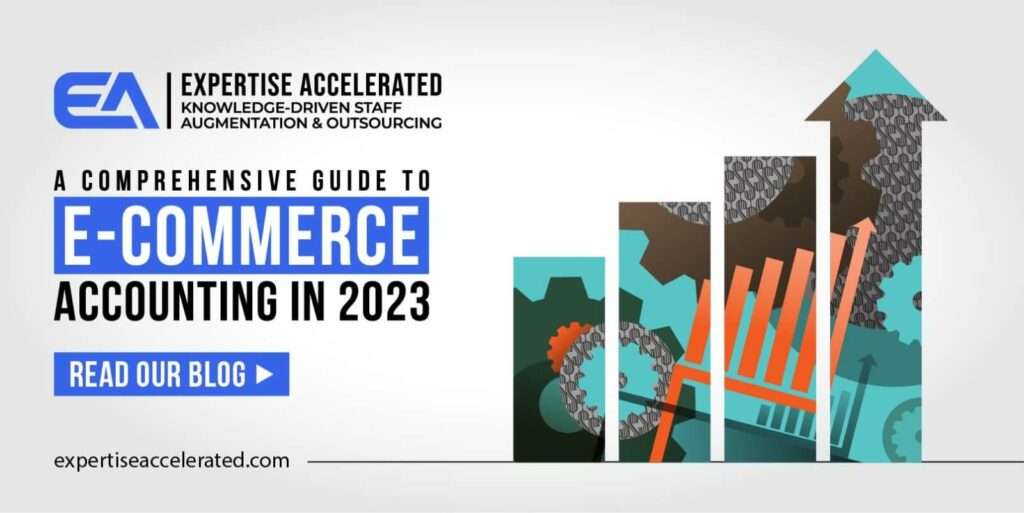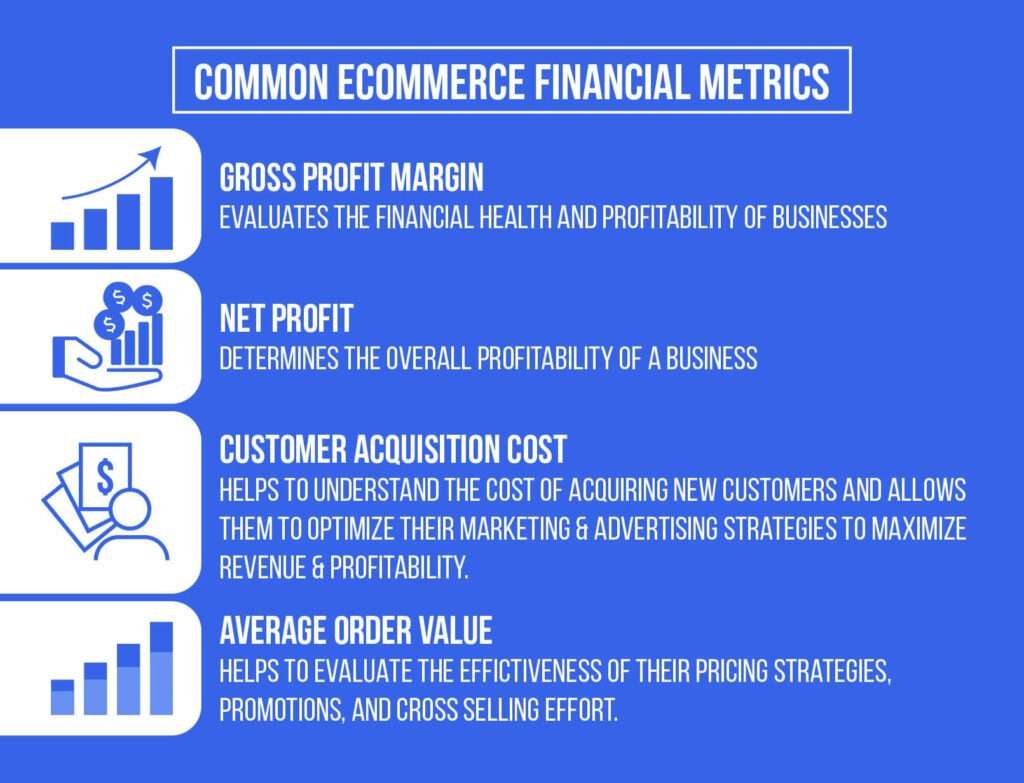When it comes to e-commerce, accounting is often overlooked in favor of marketing and sales. But the truth is, neglecting your finances can be a costly mistake. Learn why e-commerce accounting should be a top priority for any online business owner
Gone are the days when accounting was a tedious and time-consuming task that required countless hours of manual entry. Thanks to modern technology and innovative software, e-commerce accounting has never been easier or more streamlined.
From setting up your chart of accounts to tracking inventory. This guide includes guidelines about effective accounting for e-commerce businesses.
We will also explore the use of artificial intelligence and machine learning to automate tedious tasks and improve the accuracy of your financial results. And the impact of e-commerce on accounting.
So whether you are a seasoned e-commerce entrepreneur or just starting, our guide to e-commerce accounting in 2023 is your ticket to success. Don’t let accounting hold you back – master it today and watch your business thrive!
Table of Contents
What is E-Commerce Accounting?
E-commerce accounting is a specialized form of accounting that deals with the financial activities of businesses operating in the e-commerce industry.
It involves the application of accounting principles and practices to record, track, and report financial transactions related to businesses online.
Last year, Expertise Accelerated explained what e-commerce accounting is in detail here.
Effective e-commerce accounting is crucial for several reasons. First, it helps businesses to monitor their financial performance, identify trends, and make informed decisions based on accurate and up-to-date financial information.
Second, it ensures that your e-commerce business is compliant with the relevant laws and regulations. Thus reducing the risk of penalties and fines. Finally, it helps businesses manage their cash flow effectively and maximize their financial resources.
Why Is E-Commerce Accounting Different?
E-commerce accounting adheres to general principles applicable to all businesses, but it poses several additional accounting issues due to the nature of the industry.
- E-commerce is an inventory-based enterprise. Therefore, managing inventory in e-commerce is more complicated than in traditional store-fronts.
Inventory tracking involves monitoring production in foreign factories, warehouse storage, remote storage, multiple distribution channels, and items in customer carts and return shipments.
- Tracking transactions for e-commerce companies is more complex due to the volume of activities involved. Bank statements are insufficient for capturing e-commerce activities. E-commerce platforms like Amazon, Shopify, and eBay pay out income net of costs such as shipping, returns, and sales taxes.
- Managing sales taxes is a significant accounting task for e-commerce businesses.
E-commerce stores must often pay sales taxes and file returns in multiple jurisdictions, unlike brick-and-mortar stores.
Essential Steps to Setting Up Effective Accounting for E-commerce
If you are running an e-commerce business, an effective accounting system is essential to ensure that you have accurate financial records and can make informed business decisions. Here is a step-by-step guide to setting up an e-commerce accounting system for your company:
1- Choose an accounting software
The first step is to choose accounting software that suits the needs of your business. There are a variety of options available, including QuickBooks, Xero, and FreshBooks, among others.
Set up your chart of accounts
Once you have selected accounting software, you must set up your chart of accounts. This will involve creating categories for income and expenses, such as sales revenue, cost of goods sold, advertising, and shipping costs.
2- Integrate your e-commerce platform
Next, you must integrate your e-commerce platform with your accounting software. This will allow you to automatically import sales data and track inventory levels.
3-Configure your payment gateway
You will also need to configure your payment gateway to ensure that payments are recorded accurately in your accounting system.
4- Automate your processes
Consider automating processes such as invoicing, recurring billing, and expense tracking to save time and reduce errors.
5- Set up sales tax
Make sure to set up sales tax correctly in your accounting software, considering the tax rules and regulations for the states where you have nexus.
6- Regularly reconcile your accounts
To ensure the accuracy of your financial records, it is important to regularly reconcile your accounts by comparing your accounting records with bank and credit card statements.
7- Hire an expert if necessary
If you are unsure about how to set up your e-commerce accounting system or need assistance with more complex accounting issues, consider hiring an accounting professional with experience in e-commerce. Continue reading to learn more about how EA’s experts can help your company with e-commerce accounting.
Efficient Accountants for E-commerce for Cost Optimization and Talent Pooling
Experts at Expertise Accelerated understand the importance of cost optimization and finding ways to streamline processes. That is why, as part of our outsourced services, we provide e-commerce accounting services to cost-efficient companies. We have a global talent pool in the supply chain, finance, and accounting functions.
Haroon Jafree, an experienced CEO and CPG industry expert leverages his extensive network of skilled professionals, to help companies close the skills gap and optimize their accounting processes. This ensures they have accurate financial records and can make informed business decisions.
With our focus on cost optimization, EA can help businesses save money while improving their operations, allowing them to stay competitive in the ever-changing e-commerce landscape.
If you want to know more, book a 15-minute free consultation and streamline your e-commerce accounting procedures.
Impact of E-Commerce on Accounting
Recently CNBC stated that Target, one of the largest retailers in the US, has recently made a significant investment in e-commerce by announcing a $100 million investment in hubs to speed up delivery. This move reflects the company’s growing commitment to online sales, as e-commerce continues to grow rapidly and become a key driver of revenue for many businesses.
As a result, accounting professionals working in the e-commerce space will need to stay up-to-date with the latest innovations to help their clients navigate this fast-changing landscape.
As large retail companies like Target, Walmart, etc expand their e-commerce operations accountants have to consider the e-commerce accounting implications of this trend. For example, accountants have the need to properly account for online sales and inventory. There will also be potential tax implications of selling products across state lines.
Overall, the above example of Target provides a relevant and timely example of the importance of e-commerce accounting in 2023.
Challenges of Streamlining E-commerce Accounting with Automation
It is not always sunshine and rainbows when streamlining e-commerce accounting with automation. Jason Richelson from accountingTODAY recently wrote a blogpost about how bookkeepers working with e-commerce vendors often face the challenge of manually entering transaction data from multiple systems, which use different reporting formats.
Plus, the article describes how it can be difficult to build customized integrations as each vendor may use accounting principles that are different from GAAP. The advancement of AI in recent years holds promise for the future of bookkeeping solutions for e-commerce, but collaboration and standardization efforts are needed to fully realize its potential.
Key Takeaways

Numbers may not be everyone’s cup of tea, but when it comes to running a successful e-commerce business, they’re essential. Hopefully, this guide will help towards taking control of your finances and using them to drive growth and success in your online store. If it still seems overwhelming you can always consider taking the help of our professional.


